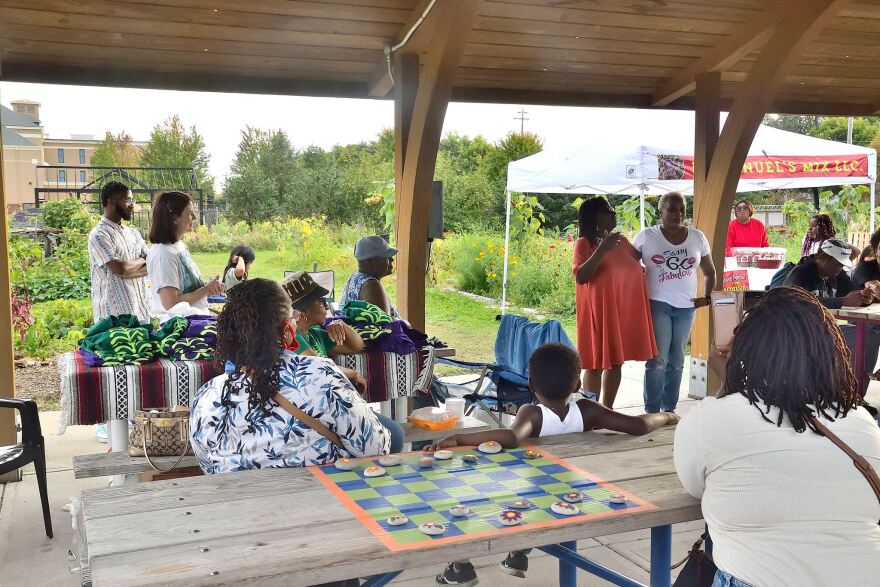This year marks 50 years of growing and urban farming for Alice’s Garden Urban Farm in Milwaukee. The jubilee celebration will include a number of community programs as well as a logo design contest that’s already underway.
“Our committee just thought it would be great to have a logo contest to invite the community in to create what it means to be 50 years old as Alice’s Garden,” Executive Director Venice Williams explains.
Williams calls the jubilee a celebration of “all the different people, and families and organizations who have treaded the land that is Alice’s Garden Urban Farm, whose fingers have touched the soil, who have grown food for their families and their organizations.”
However, the period leading to the garden’s creation is a painful story, she says. The land that Alice’s Garden sits on had been Bronzeville, a vibrant and thriving African American community within Milwaukee.
“During the Great Migration, when Black folk came from the South, you could not live north of North Avenue. When the city decided to build the highway that was never built, claimed eminent domain and uprooted all of those families, the land sat vacant for a couple of years," Williams explains.
She says, “I also had that image in my head of how lonely the earth had to be after having all of that vibrancy.”
Cheri Johnson, Alice’s Garden spiritual director, found maps of the neighborhood that reflect the vibrancy of the past. “They showed all the houses plotted and the knitting factory and the corner stores that were in the neighborhood and it just showed the vibrancy of the community and as Venice said, the loss when that was torn apart and people’s lives were torn apart,” Johnson says.
The original garden was planted in the vacant space and was names in honor of Alice Meade-Taylor, a longtime advocate for urban community programs in Milwaukee.
When Venice Williams came to the garden in 2003 it was in desperate need of attention.
“It was a hot mess, OK let’s just say it,” Williams says. “The very first year, I planted nothing. The soil was not ready to receive. There were piles that I thought were piles of soil and it was piles of trash.”

Over the years, the garden and programming around it has flourished.
Johnson says a long table is a physical and symbolic tool. It can always welcome more people.
“So we have a pizza oven and we have a fire pit and we have this long table that on a Tuesday and Thursday evening is full of the items makers have made, who come to offer their creativity — soap, to special teas to jewelry — but that draws in even more people who then get to learn about the garden,” she explains.
An environmental thread runs through the garden’s programming. A 20,000 gallon cistern captures rainwater that then is used to water the garden.
Beyond that physical example of conservation, Williams says they share practical steps people can take.

“So when you come to the gate, you’ll see a sign that says no plastic water bottles — so it provides the first step. Part of environmental education is when we can talk about why no water bottles,” she explains.
This season styrofoam containers will no longer be allowed in the garden.
Another teaching tool is its planting methods, which Williams describes as regenerative without the use of chemicals.
“We don’t beat you over the head with environmental education in the sense of doom and gloom; so that’s really what keeps a lot of people away from this conversation in our community,” she explains. “But when you have that conversation and it’s about how it impacts your daily living then it’s a different conversation.”
Williams says sharing the fact that one teaspoon of soil has at least 50,000 living organisms in it, “and how soil is alive and it breathes, those are the beginning points, the starting points for our conversations relating to the earth and caring for it."
As Alice’s Garden grows into its next chapter, Williams says work remains. “Our presence as part of the neighborhood and engaging neighbors could be stronger,” she says.
Particularly to the garden’s west, Williams says the neighborhood is quite transient.

“We have to introduce ourselves to the neighborhood and to the community all the time and we haven’t really been able to do that these past two growing seasons, but we’re hoping that’s going to be different this growing season,” she says.
Williams hopes that this jubilee year and growing season will bring more people to the garden.
“I really love it when we can gather around that table in community,” she says. “Alice’s Garden has become one of the city of Milwaukee’s best offerings for people to get to know one another and to get to know themselves and creation again a little better.”
READ: Alice's Garden: A Place Of Healing In Milwaukee
Williams says that includes gathering at the table. “We haven’t been able to have the large meals that we have wanted to have because of the pandemic, potlucks went bye bye, you just couldn’t’ share food in that way."
The immediate focus is the jubilee logo contest. Entries must be received by Friday, March 18.
Have an environmental question you'd like WUWM's Susan Bence to investigate? Submit below.
_






